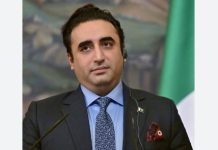MOSCOW, MAR 26: Russia will station tactical nuclear weapons in Belarus, President Vladimir Putin said on Saturday, sending a warning to NATO over its military support for Ukraine and escalating a standoff with the West.
Although not unexpected and while Putin said the move would not violate nuclear non-proliferation promises, it is one of Russia’s most pronounced nuclear signals since the beginning of its invasion of Ukraine 13 months ago.
The United States — the world’s other nuclear superpower — has reacted cautiously to Putin’s statement, with a senior administration official saying there were no signs Moscow planned to use its nuclear weapons.
Putin likened his plans to the US stationing its weapons in Europe and said that Russia would not be transferring control to Belarus. But this could be the first time since the mid-1990s that Russia were to base such weapons outside the country.
“There is nothing unusual here either: firstly, the United States has been doing this for decades. They have long deployed their tactical nuclear weapons on the territory of their allied countries,” Putin told state television.
“We agreed that we will do the same – without violating our obligations, I emphasise, without violating our international obligations on the nonproliferation of nuclear weapons.”
Tensions have grown over the war in Ukraine after heavy supplies of Western weaponry to Kyiv and Moscow shifting its rhetoric on its military operation away from “demilitarisation” of its neighbour to fighting “the collective West” there.
Some hawkish Russian politicians and commentators have long speculated about nuclear strikes, saying Russia has the right to defend itself with nuclear weapons if it is pushed beyond its limits.
“Tactical” nuclear weapons refer to those used for specific gains on a battlefield rather than those with the capacity to wipe out cities. It is unclear how many such weapons Russia has, given it is an area still shrouded in Cold War secrecy.
Experts told Reuters the development was significant since Russia had until now been proud that unlike the United States, it did not deploy nuclear weapons outside its borders.
The senior US administration official noted that Russia and Belarus had been speaking about the transfer of nuclear weapons for some time.
“We have not seen any reason to adjust our own strategic nuclear posture nor any indications Russia is preparing to use a nuclear weapon. We remain committed to the collective defence of the NATO alliance,” the official said.
NATO’s threshold
Putin did not specify when the weapons would be transferred to Belarus, which has borders with three NATO members — Poland, Lithuania and Latvia. He said Russia would complete the construction of a storage facility there by July 1.
“This is part of Putin’s game to try to intimidate NATO … because there is no military utility from doing this in Belarus as Russia has so many of these weapons and forces inside Russia,” said Hans Kristensen, director of the nuclear information project at the Federation of American Scientists.
It was also unclear where in Belarus the weapons would be stationed. The transfer would expand Russia’s nuclear strike ability along NATO’s eastern border.
Although the Kremlin has never publicly confirmed it, the West has long being saying that Russia keeps nuclear-capable missiles in Kaliningrad, its Baltic coast exclave between NATO and European Union members Poland and Lithuania.
The International Campaign to Abolish Nuclear Weapons called Putin’s announcement an extremely dangerous escalation.
“In the context of the war in Ukraine, the likelihood of miscalculation or misinterpretation is extremely high. Sharing nuclear weapons makes the situation much worse and risks catastrophic humanitarian consequences,” it said on Twitter.
Putin said that Belarusian President Alexander Lukashenko had long requested the deployment. There was no immediate reaction from Lukashenko.
While the Belarusian army has not formally fought in Ukraine, Minsk and Moscow have a close military relationship. Minsk allowed Moscow to use Belarusian territory to send troops into Ukraine last year and the two nations stepped up joint military training.
“We are not handing over (the weapons). And the US does not hand (them) over to its allies. We’re basically doing the same thing they’ve been doing for a decade,” Putin said.
“They have allies in certain countries and they train … their crews. We are going to do the same thing.”
Russia has stationed 10 aircraft in Belarus capable of carrying tactical nuclear weapons, Putin said, adding that it had already transferred to Belarus a number of Iskander tactical missile systems that can launch nuclear weapons.
“It’s a very significant move,” said Nikolai Sokol, a senior fellow at the Vienna Centre for Disarmament and Non-Proliferation.
“Russia had always been very proud that it had no nuclear weapons outside its territory. So, now, yes, they are changing that and it’s a big change.”

















